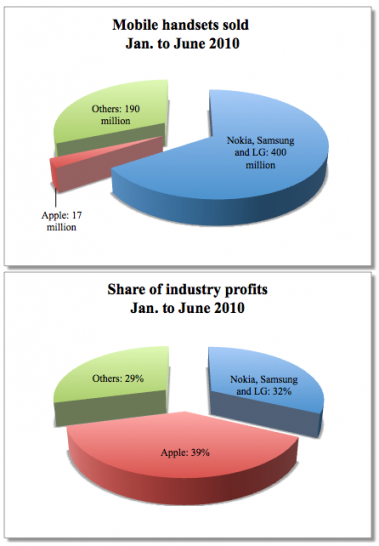Market Share Versus Profit
September 23, 2010
Recent estimates peg Apple at having 4.5% of the global mobile phone market. That's a small number, but something's not right. Regardless of the fact that Apple has less than 5% market share, they generate 39% of the profit in the entire industry. Apple generates more profit than LG, Samsung and Nokia combined. How can that be?
A critical difference between Apple's strategy and that of Google's Android-based manufacturers, along with RIM, Palm and Windows Mobile is that Apple derives it's profit from hardware - not from software, services or advertising. While manufacturers like Motorola, Nokia, HTC and Samsung went to war over price, they focused on making cheap phones even cheaper. The idea of a phone for zero dollars with a contract was their game. Over the past few years, companies like Nokia managed to sell zillions of phones. Going after sales volume is fine, but what happens if a player enters the game and raises consumer expectations?
What happens is that Nokia's revenue dropped 93% from 2008 to 2009.
Apple entered the game and turned it upside down. Simply put, it reinvented the phone by introducing the iPhone, its integration into iTunes and now the App Store. Overnight, millions of people were willing to shell out hundreds of dollars for a phone. They were willing to shell out the cash because the iPhone allowed people to do things with their phones they couldn't imagine before it came along. Well, that's not exactly true. Plenty of us dream up and hope for technology that pushes us closer to Star Trek. I don't think most of us thought the phone was about to explode they way it has - not only as a productivity tool, but as a lifestyle.
Millions of people are still shelling out significant sums to get their hands on an iPhone. In fact, Apple can't make iPhones fast enough to even come close to meeting demand. Even so, you'll find a waiting list everywhere the iPhone is sold. What does it say about a product when, in our instant-gratification-hooked society, people will wait and then pay more –versus purchasing dozens of cheaper alternatives? It says that unless the competition comes to the table with a viable competitor to the iPhone, Apple will continue to eat their lunch.
My main point is this. How long can any company operate by selling lots of products but making little or no money? Not long. Cheap phones will always be popular because not everyone can afford an iPhone. In the end, while everyone in the mobile phone industry fights with each other over price, Apple's raking in the cash and not standing still. Nobody has managed to knock the iPhone off its pedestal. They're not going to either unless there's money to be invested in R & D and a business case to make that investment worth while. If you're not making any money, it's very difficult to make investments.
Image source: Apple 2.0 Blog, "Pie chart: Apple's outrageous share of the mobile industry's profits", Fortune Magazine, by Phillip Elmer-DeWitt
Other posts by Chris Marriott
- Seeking Backstage Resellers
- Preemptive Multi-Talking -- Johnny and the Liquidators
- Preemptive Multi-Talking -- Pundits are the worst!
- Preemptive Multi-Talking -- WWDC 2016
- Preemptive Multi-Talking -- Of Cash Piles and Job Cuts
- Preemptive Multi-Talking -- 60 Scary Minutes Edition
- Preemptive Multi-Talking -- [R]Evolution Edition
- Preemptive Multi-Talking -- Pinocchio Edition
- Preemptive Multi-Talking -- FBI vs. Apple
- Preemptive Multi-Talking -- 1984 Edition
- Preemptive Multi-Talking -- Earnings Madness Edition
- Preemptive Multi-Talking -- All your passwords are belong to us.
- Preemptive Multi-Talking -- Fog, Fizzle, Flop Edition
- Preemptive Multi-Talking -- FUD Redux Edition
- Preemptive Multi-Talking -- Privacy be Damned Edition
